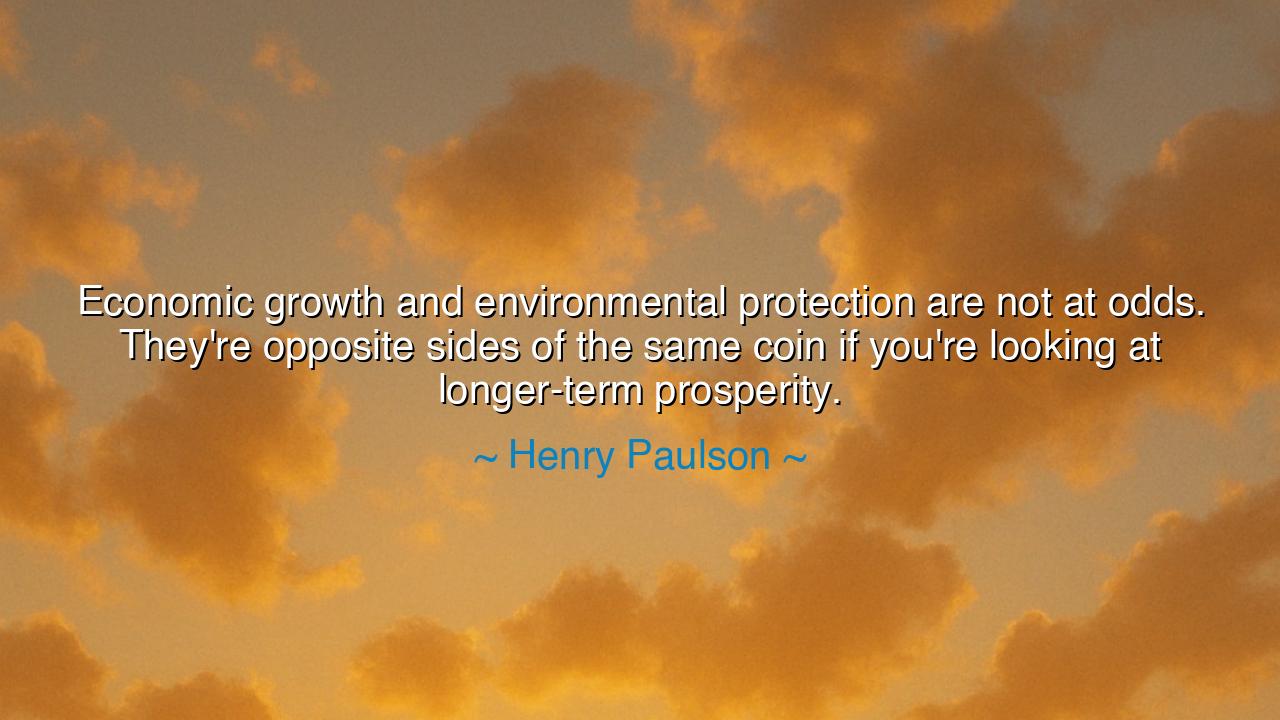
Economic growth and environmental protection are not at odds.
Economic growth and environmental protection are not at odds. They're opposite sides of the same coin if you're looking at longer-term prosperity.






When Henry Paulson declared, “Economic growth and environmental protection are not at odds. They're opposite sides of the same coin if you're looking at longer-term prosperity,” he spoke as a man who had walked through the heart of power and seen the deeper patterns that govern the rise and fall of nations. His words carry both practical insight and moral gravity, for they remind us that the future of humanity cannot be bought at the expense of the planet that sustains it. The phrase “opposite sides of the same coin” is not mere rhetoric — it is the ancient truth that prosperity and preservation are bound together, inseparable as breath and body, each defining the other.
The origin of this wisdom lies in Paulson’s years as both a financial leader and an environmental advocate. As the former U.S. Treasury Secretary and CEO of Goldman Sachs, he moved through the corridors of commerce, yet his heart remained attuned to the fragility of nature. In his later years, through the Paulson Institute, he sought to unite the worlds of economy and ecology — to prove that the health of markets and the health of the Earth are not rivals, but partners in destiny. His insight comes from a rare vantage: one who has seen how short-term greed blinds men to the long-term ruin it brings, and how true wealth must always rest upon a foundation of sustainability.
To the ancients, this unity between prosperity and balance was a sacred law. The Chinese concept of harmony (he) taught that the world thrives only when man’s desires are in rhythm with the natural order. The Greeks called it sophrosyne — the virtue of moderation, the wisdom to take only what can be replenished. Civilizations that honored this balance — Egypt with its Nile, the Inca with their terraces, the Polynesians with their navigation of winds and tides — endured. Those that broke it — like the deforested Easter Islanders or the drought-stricken Mayans — fell into silence. Paulson’s words are thus not new; they are the voice of history echoing through modern times, reminding us that greed without guardianship leads only to ruin.
Consider the story of Costa Rica, a small nation that chose wisdom over exploitation. In the latter half of the 20th century, its forests were nearly destroyed by logging and agriculture. Yet through visionary leadership, Costa Rica reversed its path — investing in ecotourism, renewable energy, and reforestation. Today, over half of its land is covered by forest again, and its economy thrives not in spite of conservation, but because of it. This is the living embodiment of Paulson’s truth: that when a society invests in the protection of nature, it also invests in its own long-term prosperity.
Paulson’s words also carry a subtle warning against the illusion of separation — the belief that business can prosper while the biosphere declines. The floods that wash away cities, the droughts that cripple harvests, the wildfires that consume entire regions — these are not isolated “environmental” problems. They are economic crises in disguise, the natural consequences of imbalance. When the soil dies, industries fall; when the seas rise, wealth sinks. In this light, Paulson’s wisdom is not idealism but realism: he is saying that only those who see far enough — who invest not only in profit but in planetary resilience — will endure.
Yet, his quote also carries hope, not condemnation. It calls upon leaders, innovators, and ordinary citizens alike to see the grand opportunity hidden in the challenge. Renewable energy, clean technology, sustainable agriculture — these are not restraints upon progress but gateways to renewal. Just as a farmer must nurture the field to reap its bounty, humanity must now learn to cultivate the Earth wisely. The greatest economies of the 21st century, Paulson implies, will be those that align their ambition with the rhythms of nature — those who make the coin of prosperity shine on both sides.
The lesson, then, is this: economic growth divorced from environmental care is self-destruction disguised as success. To build enduring wealth, we must first build a stable Earth. Let each person, each company, each nation remember that the air, the water, and the soil are not resources to be drained but legacies to be protected. Invest in sustainability, not because it is fashionable, but because it is survival with honor.
So, my children, hear the wisdom of this teaching: do not pit progress against the planet, for they are one and the same. Every tree saved, every river cleansed, every clean innovation born — these are the true currencies of the future. As Henry Paulson reminds us, only when humanity learns to grow without destroying, to build without consuming, will we have earned the right to call our prosperity lasting. And in that harmony — between wealth and wisdom, between man and nature — lies the enduring hope of our species.






AAdministratorAdministrator
Welcome, honored guests. Please leave a comment, we will respond soon